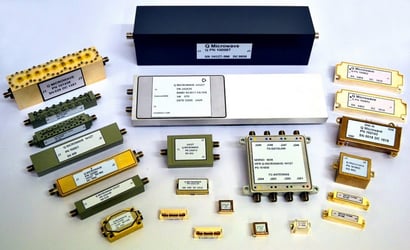Radio frequency signals permeate our environment, carrying phone calls, guiding fighter jets, and...
5 Factors to Determine Your Need for a Custom Microwave Bandpass Filter

In domains like aerospace, defense, and satellite communications, every detail and small component plays a critical role in ensuring the success of an operation. Among these components, one may find the microwave bandpass filter. It is often uncelebrated yet indispensable in ensuring the precision and efficiency of communication systems.
While standard RF bandpass filters are easily accessible and widely used, there emerges a vital question: When does an application require a custom solution? The difference between a standardized filter and a custom-made one can be the very distinction between success or failure, especially in high-risk, high-stakes environments.
Understanding whether your specific application needs a custom filter over a standardized one can critically impact the signal integrity and performance of your RF system. In this article, we aim to explore five factors that can indicate when a custom solution might be more than just a luxury, but a necessity.
Factor 1: Tightness of Specifications
The right microwave bandpass filter can ensure communication clarity, data accuracy, and even the safety of sensitive missions. If your project requires filters with exacting specifications like super-sharp roll-offs, exceptionally high rejection rates, or minimal insertion loss, it might be signaling the need for a custom solution.
A custom filter, designed for specific requirements, can provide precision where certain off-the-shelf solutions may not be a perfect fit.
Sample Application: SatCom
One application where specifications can't be compromised is in Satellite Communication Systems. Satellites, orbiting thousands of miles above Earth, rely on specific frequency bands to communicate with ground stations. NASA and U.S. Earth-observation experts are working to develop advanced sensors for satellites to more accurately monitor Earth's environment.
Ensuring these frequencies are transmitted without interference is essential, and a custom microwave bandpass filter could play a pivotal role in this process.
Factor 2: Volume vs. Cost
In the world of custom components, one of the primary considerations is always the balance between the volume of items needed and the associated costs. For many operations, off-the-shelf filters can be suitable. However, in electronic warfare environments where threats evolve rapidly or where unique system integration is essential, custom microwave bandpass filters often prove more effective.
Customized solutions can be tailored to meet specific demands, potentially eliminating the need for future adjustments or replacements, which can add up in cost over time.
On the flip side, for large-scale endeavors where thousands of units might be required, the economies of scale come into play. Here, a standardized, mass-produced bandpass filter can often be acquired at a much lower per-unit cost.
But there's a catch. Even in large-scale projects, if there's a very niche requirement that standardized filters can't meet, then custom becomes the inevitable choice, as the performance and functionality can outweigh the cost concerns.
Sample Application: Precision-Guided Munitions
Modern warfare has shifted towards precision targeting to minimize collateral damage and maximize operational success. Precision-guided munitions (PGMs) rely on specific frequencies for guidance, tracking, and detonation. In large-scale conflicts, there might be a bulk requirement for such munitions.
While standard filters can cater to many military applications, there are mission-specific needs where custom filters, tailored to those exact requirements, are essential. Given the strategic importance and the cost of misfires, custom solutions, even if more expensive, may be a superior choice.
Factor 3: Integration and Size
As RF technology evolves, integration is more crucial than ever. When incorporating a microwave bandpass filter into an existing system, there's often a need to ensure compatibility. This compatibility is not just in terms of function, but also in the filter's interfacing with other components.
The connectors, input-output considerations, and even the mechanical fit can drive the decision to opt for a custom solution. A tailored filter ensures that the design is complementary to the rest of the assembly, even down to the packaging!
Beyond just performance specifications, the physical dimensions of a filter can be mission-critical. For applications where space is at a premium or where weight considerations come into play, every inch and ounce counts. A custom microwave bandpass filter can be designed to fit exact size specifications, ensuring high performance without compromising on the space or weight restrictions.
Sample Application: UAVs and Drones
Unmanned Aerial Vehicles (UAVs), or drones, have seen a significant surge in both civilian and military applications. From surveillance and reconnaissance missions to agricultural monitoring and delivery services, drones are making their mark.
In fact, the U.S. Special Operations Command is upgrading its signal intelligence equipment to better handle a broader range of radio frequencies across all domains, including space. This transition is driven by the increasing competition in the frequency bands.
Given the diverse set of tasks UAVs perform, having custom filters that precisely match the frequency bands required for each specific application ensures clear communication and effective operation. Custom RF bandpass filters ensure that these unmanned systems maintain peak performance while adhering to design specifications.
Factor 4: Lead Times
In the world of RF engineering, timing is everything. While standardized bandpass filters might be readily available and quicker to obtain, they may not always align with the nuanced requirements of an application. Deciding between custom and off-the-shelf solutions often involves weighing the immediate need against the perfect fit.
However, there's another dimension to this consideration: production and delivery timelines. Custom filters, especially those with unique specifications, may have extended lead times due to their design, testing, and fabrication processes. But for projects where the stakes are high, the wait can be worthwhile.
An RF engineer must consider whether the application can afford to wait for a custom solution or if a standardized one, with potential adjustments, will suffice.
Sample Application: Electronic Warfare
In the modern battlefield, electronic warfare (EW) has taken center stage as a key tool to gain an advantage over adversaries. At the heart of EW are sophisticated systems designed to detect, interpret, and, if necessary, jam or manipulate opposing electronic transmissions. Precise control over specific frequency ranges is paramount, as incorrectly jamming friendly communications can be detrimental.
Many bandpass filter types play a pivotal role in these systems. Given the fast-paced evolution of electronic threats and countermeasures, having the flexibility to customize filters to adapt to new challenges becomes crucial.
In the context of EW, investing the time in developing custom RF solutions, despite longer lead times, can contribute to the military maintaining a strategic edge in the electronic spectrum.
Factor 5: Environment and Durability
Microwave bandpass filters are often expected to operate in conditions that are far from ideal. But these aren't just components used in the comfort of a controlled laboratory; they're field-grade equipment!
Filters may be exposed to extreme temperatures, from the icy colds of arctic expeditions to the sweltering heats of desert deployments. Beyond temperatures, they might face challenges like high humidity, corrosive atmospheres, or relentless physical shocks.
Moreover, the filter’s material durability isn't just about surviving these environments but consistently delivering optimal performance. Variations in temperature can have a range of effects on filter performance and durability. Vibration and shocks can introduce physical misalignments, impacting the filter's performance.
Sample Application: Naval Surface Ship Radar Systems
The security of a nation's waters is often entrusted to its fleet of naval surface ships. Central to their defense capabilities are advanced radar systems that provide real-time situational awareness. These radar systems depend on microwave bandpass filters to selectively isolate and process the desired frequency bands for target detection and tracking.
The maritime environment presents unique challenges for RF components. Exposure to salt fog or spray can be corrosive, and the constant rocking of the ship due to waves can induce mechanical stresses.
With potential electronic warfare threats from adversaries, there's a heightened need for filters with precise frequency specifications, ensuring accurate target detection and maintaining the radar's operational frequency without interference.
Custom microwave bandpass filters are essential in this scenario, enabling radar systems to operate at peak efficiency in the unpredictable naval environments.
Why Choose Custom Filters?
If any of the above factors align with your project, you may require a custom microwave bandpass filter in lieu of a standardized one.
Not only are custom microwave bandpass filters designed to meet your specific requirements, but they also come with key benefits:
- Cost-effectiveness over the product's lifecycle
- Flexibility in material selection for varied applications
- Reduced shipping timelines with local manufacturers
- Expert advice for optimal solutions
Learn more about custom microwave bandpass filters and why major industry leaders partner with Q Microwave!
Conclusion: Knowing When You Need a Custom Bandpass Filter
The intricate world of RF engineering often boils down to minute details, with the decision between standard and custom microwave bandpass filters often pivotal. As we've explored, while off-the-shelf solutions have their place, there are undeniable instances where custom-made filters shine. They offer precision, adaptability, and performance tailor-fit for specific demands.
With a rich history in designing RF filter products, our team knows the ins and outs of what makes a project succeed. Our commitment? Crafting the perfect custom microwave bandpass filters that align with your needs, ensuring you're always a step ahead in this dynamic field.
Download this fillable PDF table to send us your microwave bandpass requirements and we’ll provide you with our kick-ass expertise!





